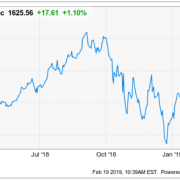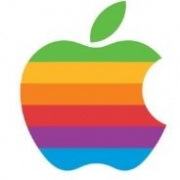The Path Ahead
The Red Sea has parted, and the path has opened up.
Technology has been a beacon of light providing comfort to the equity market, when a trade war could have purged the living daylights out of bullish investor sentiment.
If an increasingly hostile, tit-for-tat trade skirmish threatening overseas revenue can't bring tech equities to its knees, what can?
It seems the more bellicose the administration becomes, the higher technology stocks balloon.
Does this all add up?
The Nasdaq (QQQ) continues its processional march skyward. If you were a portfolio manager at the beginning of the year without technology exposure, then polish off the resume before it picks up too much dust.
The Nasdaq has set all-time highs even after a brutal 700-point sell-off at the end of January.
Apple (AAPL), Microsoft (MSFT), Netflix (NFLX), and Amazon (AMZN) can take credit for 83% of the S&P 500's gains in 2018.
And that fearsome four does not even include Facebook (FB), which has left the shorts in the dust.
Each momentous sell-off has proved to be a golden buying opportunity, propelling tech stocks to higher highs and retracing to higher lows.
And now the path to tech profits is gaping wide, luring in the marginal investor after two highly bullish events for the tech world boding well for the rest of fiscal year 2018.
Xiaomi, one of China's precious unicorns, which sells upmarket smartphones, went public on the Hong Kong Hang Seng market last week.
The timing couldn't be poorer.
The rhetoric between the two global leaders reached fever pitch with the administration proposing $200 billion worth of tariffs levied on Chinese imports.
China reiterated its entrenched stance of not backing down, triggering a tense war of words between the two global powers.
The beginning of March saw the Shanghai stock market nosedive through any remnants of support levels.
The 50-day moving average, 100-day, and 200-day were smashed to bits and Shanghai kept trending lower.
The trade skirmish has had the reverse effect on Chinese equities compared to the Nasdaq's brilliance, and combined with the strong dollar, has seen emerging markets hammered like the Croatian soccer team in Moscow.
Xiaomi's IPO was priced in the range of HK$17 to $22, and when it opened up on the first day at HK$16.60, investors were holding their breath.
Take the recent IPO triumph of cloud company Dropbox (DBX), whose IPO was priced in the expected range of US$18 to $20. The first day of trading showed how much appetite there is for to- quality cloud companies, with Dropbox starting its trading day at US$29, 40% higher than the expected range.
Dropbox finished its first day at a lofty US$28.48, a nice 35% return in one trading day.
No doubt Xiaomi's shares were not expected to perform like Dropbox, but it held its own.
Astonishingly, this company did not even exist nine years ago and is now the fourth-largest smartphone manufacturer in the world, grossing $18 billion in revenue in 2017.
The unimaginable pace of development highlights the speed at which the Chinese economy and consumer zigs and zags.
Chinese retail sales were up a staggering 9% YOY for the month of June 2018. Its overall economy met its 6.7% target for the second quarter of 2018.
The price range settled for the IPO gave Xiaomi a valuation of $54 billion.
Instead of getting roiled, Xiaomi came through with flying colors posting a 26% gain after the first week of trading.
Poor price action could have given Beijing ammunition to cry foul, laying blame for the underperformance on the U.S. tariffs.
The healthy price action underscores there is still room for Chinese and American companies to flourish in 2018, albeit through a highly politicized environment.
Specifically, Apple comes through unscathed as a disastrous Xiaomi IPO could have resulted in negative local press stoking higher operational risks in greater China.
Apple is in the eye of the storm, but untouchable because it employs more than 4 million local Chinese employees throughout its expansive ecosystem and has been praised by Beijing as the model foreign company.
Apple earned $13 billion in revenue from China in Q2 2018, a 21% YOY increase.
Hounding Apple out of China will be the inflection point when tech investors know there is a serious problem going on and need to hit the eject button.
If this ever happens, The Mad Hedge Technology Letter will be the first to resort to risk off strategies.
BlackRock's (BLK) CEO Larry Fink let everyone know his piece saying, "the lack of breadth in the equity markets is troubling."
Investors cannot blame tech companies for executing their way to the top behind the tailwind of the biggest technological transformation in mankind.
And even in the tech industry, winners can turn into losers in a blink of an eye, such as legacy tech company IBM (IBM).
Someone better tell Fink that this is the beginning.
Amazon recorded 44% of total U.S. e-commerce sales in 2017, equaling 4% of total retail sales in the U.S.
This number is expected to breach 50% by the end of 2018.
The second piece of bullish tech news was lifting the ban on Chinese telecommunications company ZTE.
It is open for business again.
From a national security front, this is an unequivocal loss. However, it saved 75,000 Chinese jobs and gave a small victory to American regulators attempting to patrol the mischievous behemoth.
The U.S. Department of Commerce lifted the seven-year ban even after ZTE sold telecommunication products to North Korea and Iran.
ZTE was fined $1 billion, changed the senior management team, and put into place an American compliance team that will monitor its business for the next 10 years.
Diluting the penalty lowers the operational risk for American tech companies because it shows the administration is willing to reach compromises even if the compromise isn't perfect.
China is a lot less willing to ransack Micron and Intel's China revenues, if America allows China to save face and 75,000 local jobs.
This is a big deal for them and their employees.
America has a strong hand to play with against China because China still requires Uncle Sam's semiconductor components to build its future.
This hand is only effective if Chinese still thirst for American technology. As of today, America is higher on the technological food chain than China.
The move is also a model of what the U.S. Department of Commerce will do if Chinese companies run amok, which Chinese tech companies often do because of the lack of corporate governance and transparency.
These two recent China events empower the overall American tech sector, and the market will need a berserk shock to the tech ecosphere foundations to make it crumble.
As it stands, the tech sector is handling the trade war fine, and with expected blowout tech earnings right around the corner, short tech stocks at your own peril.
________________________________________________________________________________________________
Quote of the Day
"All of the biggest technological inventions created by man - the airplane, the automobile, the computer - says little about his intelligence, but speaks volumes about his laziness," - said author Mark Kennedy.







